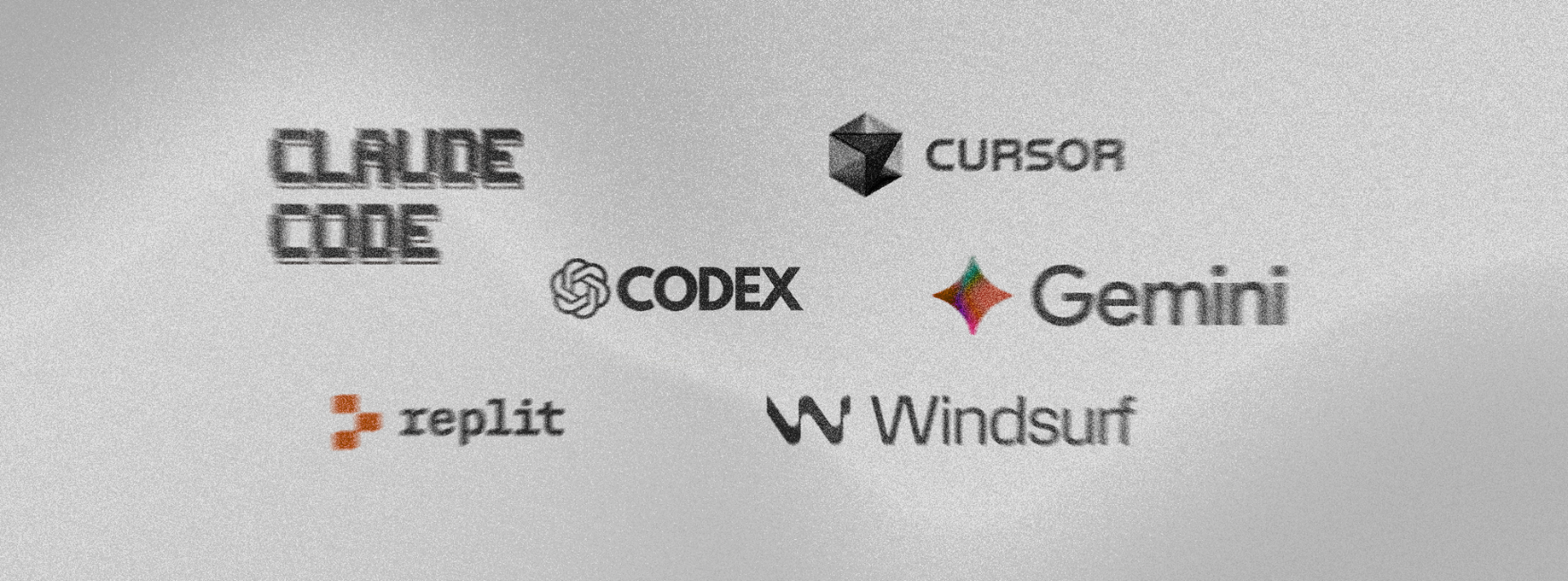If you’ve been around Reddit lately, you’ve probably seen the word vibe coding floating around. The term came from Andrey Karpathy, and it basically describes a new way of building things with AI — fast, intuitive, and a bit chaotic in a good way.
The idea caught on quickly. Every week there’s a new “AI coding” tool popping up, and it’s almost impossible to keep track of what’s actually worth using.
At Solveo, we’re deep in this space — we test tons of AI tools for our own projects and also use them when working with clients. So, when “vibe coding” started trending, we had to check what tools people actually use day to day.
We turned to Reddit for that. Two of the biggest communities — r/vibecoding (almost 89k members, growing ~16% monthly) and r/VibeCodeDevs (around 15k members, +11% monthly) — are where most of the talk happens. Together, they see over a hundred new posts a day and thousands of comments from people sharing setups, asking for recommendations, or reviewing new tools.
That’s where we started digging.
Methodology
We went through 50+ threads and 1,000+ comments across these vibe-coding communities to find out which tools people really use, like, or complain about.
The process was simple — we searched for posts mentioning phrases like “ai coding assistant,” “vibe coding setup,” or just “tool” and collected every mention that came from real usage, not hype.
After cleaning up duplicates and grouping similar mentions (like “Claude 3,” “Claude Code,” or “Claude Opus”), we ended up with 21 tools that appeared most frequently in conversations.
The Reddit Ranking: 6 Most Mentioned Vibe Coding Tools
In this first part, we looked at the six most-mentioned tools — Claude Code, Cursor, ChatGPT/Codex, Gemini, Replit, and Windsurf. These aren’t necessarily the best tools, but they’re definitely the ones people actually use, talk about, and sometimes argue over.
Now let’s get to the good part — how vibe-coders are actually using them right now.
Claude Code - 226 Mentions
Claude Code sits at the top of the vibe-coding stack. For many, it’s not just a coding assistant; it’s the main workspace.
“Since I started using Claude Code to build software products only using vibe coding, I’ve been using IDEs less. I used to love RustRover or PyCharm, but now Claude keeps me in the terminal while it finishes tasks.”
Others use it as both a builder and a teacher:
“I’m using Claude Code Opus 4, and loving it. It’s a good teacher — you can parse your own errors and edit yourself sometimes.”
And for planning too:
“I use Claude Code to help build technical requirements and feature lists with steps to complete each one.”
What Reddit Likes
Redditors praise Claude for its speed, deep context, and ability to handle huge projects — from full app builds in hours to massive refactors that used to take months.
What Frustrates Users
The same users complain about its short memory, bloated code, and expensive token use, often calling it “an overconfident junior dev with amnesia.”
Verdict
If vibe coding had a flagship tool, Claude Code would be it — fast, capable, but unpredictable. It’s brilliant when guided well, frustrating when left to run wild.
Cursor - 219 Mentions
If Claude Code is the brain of vibe coding, Cursor is the hands. Many redditors describe it as the place where everything clicks.
“Cursor with Claude Opus 4 — the autocomplete and chat integration is unmatched for flow state coding.”
Others combine it with Claude to balance costs and workflow:
“Claude in CLI and Cursor Agent where I can ask to write code using mobile app… I use Cursor when I exceed the token limit of Claude Code or when I’m commuting.”
Another summed it up simply:
“Cursor is the best for integrating everything together and quick feature changes and upgrades.”
What Reddit Likes
Users love Cursor for its speed, smooth autocomplete, and familiar VS Code-like feel. It’s ideal for rapid prototyping (“I was ready with the MVP in a week”) and flexible enough to switch between Claude, GPT, and other models as needed. Many describe it as “a more efficient Google” for debugging and learning.
What Frustrates Users
Performance inconsistency is the main complaint — “It went from life-changing to horrible in two weeks,” one dev wrote. Others mention random file edits, missing transparency from the company, and the risk of wasted time fixing Cursor’s unwanted “help.”
Verdict
Cursor nails the vibe of hands-on coding with AI — fast, integrated, and familiar — but its reliability still swings between genius and chaos. For many, though, it’s the go-to tool that ties their whole stack together.
ChatGPT / Codex — 109 Mentions
If Claude and Cursor are for flow and experimentation, ChatGPT and Codex are for precision. Many vibe-coders treat them as their “no-nonsense” pair — quick, reliable, and great for scoped problems.
“Codex is great for the senior dev that wants the most minimal amount of code to complete a ticket.”
Others rely on ChatGPT for the thinking side of coding:
“ChatGPT for architecting, planning and coding solutions — mostly o4-mini-high, sometimes o3 when I want more reasoning and less code.”
Some even stretch it beyond coding altogether:
“I used ChatGPT to read my codebase, understand my goal, list all elements, create steps for each module, and open a new instance to criticize and improve the plan.”
“Codex just got released for Plus users — I can now schedule tasks and run multiple instances.”
What Reddit Likes
Users love ChatGPT and Codex for their clean, production-ready output and thoughtful planning abilities. They’re great at debugging, writing unit tests, or explaining tricky code — “like having a mid-career engineer with perfect recall,” as one user put it.
What Frustrates Users
The biggest gripes are inconsistency, limited context, and the need for heavy supervision. “It’s brilliant one day and can’t solve FizzBuzz the next,” one dev joked. Others note that long sessions get slow or reset entirely, breaking the flow.
Verdict
ChatGPT / Codex are the dependable workhorses of vibe coding — sharp, disciplined, and great at contained tasks. Just don’t expect them to manage sprawling projects or remember what you said an hour ago.
Gemini - 91 Mentions
Gemini has become the go-to planner for many vibe-coders. It’s the tool you call when you need structure before the chaos begins.
“I take my repo to Gemini, have it write up instructions for Claude, and then give it to Claude. While this costs more tokens, it usually gets it in one go.”
Some use it to lay the foundation for entire projects:
“BMAD Method — Gemini 2.5 Pro with a custom BMAD Gem for brainstorming. Once I’ve got the PRD and docs, I move over to Claude Code to shard into stories and write the code. Feels OP.”
Others lean on it purely for deep research and long-context planning.
“I use Gemini for planning and research given its huge context window and obvious search ties.”
A few even build full workflows around it:
“I spend $500 a month — half goes to Gemini Ultra for deep-think and research features. It does spec planning and code reviews; Claude Sonnet on Cline writes my code.”
What Reddit Likes
Redditors appreciate Gemini’s huge context window and research-first design. It’s the calm, methodical partner to Claude’s fast execution — great for planning specs, drafting PRDs, and handling “big-picture” logic before coding begins.
What Frustrates Users
The downside: Gemini’s reliability swings wildly. Users call out frequent “downgrades,” endless apology loops, and slow IDE integrations that break their flow. It often sounds confident while being wrong, forcing constant fact-checking.
Verdict
In the vibe-coding stack, Gemini plays strategist — brilliant at context, organization, and ideation, but risky when you hand it the keyboard. It shines as a co-pilot for planning, not production.
Replit - 83 Mentions
For a lot of vibe-coders, Replit is where it all started. It’s the “open browser, start typing” kind of tool — no setup, no installs, just instant building. Even now, it’s still the go-to when you want to get something running fast.
“I use several tools simultaneously. Replit for some things (Agent for bigger things, Assistant for adjustments, iterations).”
“Replit for starting complex apps that intend to be full-blown production-grade deployments later.”
“I’ve been using Replit for infra mainly and code agent for debugging deployments, and Cursor + Claude Max for feature dev. I started playing with Cursor background agents for QA, security, and general code quality audits, but find that it fails to replicate the Replit hosting environment on AWS.”
“Just got a Replit Core account for work and built a conference app in a day. We spent over 2k for a similar app through Sched 2 years ago. I’m excited to learn more!”
That pretty much sums up how people use it. Replit is both the launchpad for quick prototypes and a surprisingly capable environment for bigger stuff. Its built-in hosting, database, and GitHub sync make it an easy all-in-one setup — great for testing ideas, teaching yourself to code, or hacking together an MVP on a weekend. Old-school users still talk about the early days of free hosting and that community vibe when everyone was just sharing projects for fun.
What Reddit Likes
It’s fast, dead simple, and everything’s in one place. Replit makes it ridiculously easy to start building without touching your local setup.
What Frustrates Users
The credit system is the main pain point — unpredictable costs that add up fast. And the AI Agent can be hit or miss: buggy loops, ignored instructions, or half-baked “fixes” that break more than they solve.
Verdict
Replit still nails the “just start building” energy that kicked off vibe coding in the first place. It’s where ideas are born — even if most devs move on to heavier tools once things get serious.
Windsurf — 73 Mentions
Windsurf doesn’t make as much noise as Cursor or Claude Code, but it’s quietly building a loyal fanbase. Redditors describe it as fast, clean, and great for complex projects that need real structure.
“I’m very happy with Windsurf — Windsurf with Sonnet 3.7 is decent. I invoke the BYOK Sonnet 4 if 3.7 gets stuck.
Pair it with TaskMasterAI for iterative task management and decomposition.”
Some use it mainly for agentic workflows and production-level builds.
“I use Windsurf for agentic workflows and code changes, usually with Claude Sonnet as the LLM.”
Others rely on it for planning and product work.
“Windsurf and Claude for planning/scoping. Great recipe.”
And a few have already shipped full products with it.
“I used Windsurf and did ship my product, going at appx 1k MRR right now.
It has been 4 months since the launch.”
What Reddit Likes
Windsurf earns praise for its strong multi-file context and performance. Users love how it keeps track of large codebases and microservices without losing focus. The SWE-1.5 model gets frequent shoutouts for being “genuinely faster.” Its clean UI, useful Codemaps feature, and fair $15/month price also stand out as major positives.
What Frustrates Users
The main complaint is unreliable code edits — Windsurf sometimes changes or deletes working code without showing inline diffs. Others report occasional freezes, broken terminal commands, or confusion around credit usage. The quality can vary depending on which Sonnet model is running.
Verdict
In the vibe-coding stack, Windsurf feels like the underdog that’s slowly earning respect. It’s fast, affordable, and powerful enough to ship real products — just not without a few rough edges. When it’s good, it’s really good.
Wrapping Up: The Vibe Stack, Part 1
If there’s one thing we learned from scrolling through thousands of comments, it’s that there’s no single “best” tool for vibe coding. What works for one developer might drive another crazy — and that’s kind of the point. Each tool fills a different gap, depending on how you like to work, what you’re building, and how much chaos you can handle.
In part we’ll cover the rest of the stack — the underrated newcomers, the niche favorites, and the tools quietly building loyal fanbases behind the scenes. Stay tuned.







.svg)